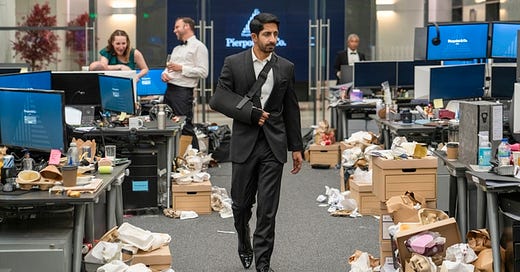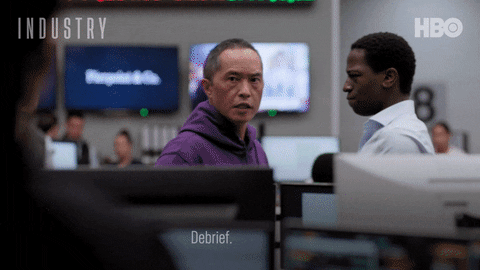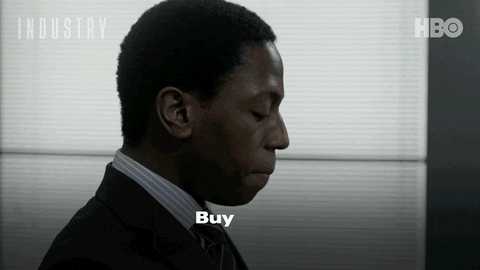Welcome back to The Angle 👋 🍂 We are more than halfway through October and I’ve only had one Pumpkin Spice Latte. Do you know a Tall latte now costs £4.95?! No wonder Starbucks is struggling…
The third season of Industry is exceptional.
I am late to the party, I know.
Everyone in the US already knows how exceptional the third season because it dropped onto their screens in August, meanwhile, across the pond, we just got the new season on Iplayer at the start of this month.
You know, it’s a British show, we really should get first dibs.
I ever think I’d be writing the subject line “the best writing on TV this year?” and be referring to Industry.
I felt meh about the first season.
Initially it captivated me. I was taken with how accurately it captured London’s financial district from the absurdity of the shoe shine guy who roams the trading floor; the clashing of brash personalities who head up the various desks; the awkward elevator journeys in towering skyscrapers, and, of course, the anxious competitiveness and obnoxiousness of my peers.
I vividly remember my first week on the graduate scheme at an investment bank. A week of attending an absurd amount of presentations, an absurd amount of “networking,” and then also getting acclimatised to your desk and co-workers.
On the Wednesday of that week, a presentation ran from from 5pm-6pm. As I left to head home for the day, I felt a tap on my shoulder, “Where are you going?” asked one of the grads. Confidently I told him I was leaving because there was no reason to stay late — I had no work to do yet. He conceded he also no work to do, but would still go back to his desk and read a book into the evening for “visibility purposes.”
That was the vibe of working at an investment bank in London as a grad and Industry captured it perfectly. But the portrayal was also insincere. It felt like a glossy magazine lacking substance.
Maybe lacking substance isn’t the right word choice? There’s plenty of substances and sex in each episode.
By the sixth episode, it felt tired despite the plotline striking a chord with me. Months before I started my internship, two individuals working in Canary Wharf died on the job — a graduate dying at Pierpoint & Co is the plotline for the first season.
What I struggled with was the lack of cohesion between the episodes. The sex, substances, and quick wit could only get the show so far. I never remembered to watch the seventh episode.
Then in August when chatter about Industry turned to an uproar, I got pulled back in, seeking to fill the HBO-sized void left from finishing White Lotus and Succession.
I devoured the entire third season at a disconcertingly rapid rate.
You know the type of captivation where you need really need to pause the TV and get up to finish some work or do the dishes, but you literally can’t tear yourself from the screen.
You just can’t avert your eyes despite hating every single character (Rob gets a pass, he’s an alright guy). That’s the beauty of Industry.
The second season demonstrated some of this potential, but it was the third that took it to another level. Industry’s substance is finally on par with its glossy exterior.
And audiences responded. Industry averaged 1.6 million viewers per episode, which was up 40% compared to the second season, per a media release from HBO. It’s also just been renewed for a fourth season. I won’t give any spoilers, but as a viewer you are left with the impression the writers weren’t expecting a renewal. It’s a perfect series ending, rather than a season ending, and it’s hard to see clearly where it goes from here.
There are some hints we could be leaving dreary London and heading State side for the fourth season, which could open the door to more ambitious plot lines.
As someone who has interviewed my fair share of overconfident shamelessly wealthy 20-something startup founders as well as no-fucks given hedge fund managers, Industry’s second and third season perfectly encapsulated the world of finance in London. The commentary on class dynamics is particularly on the nose, highlighting the “old boys” club dynamics between British publishers, politicians and financiers.
Creators Mickey Down and Konrad Kay spoke about wanting to shake-up British TV. I think they’ve done that this season. It would be a shame to see Industry become America-centric as we severely lack any good dramas based in the UK which don’t center on either murder or detectives solving murders.
“Me and Mickey were coming from a point of thinking so much British TV was bad—and we just had a feeling deep in our stomach, which is, like, we can fucking do this better than that.” - Konrad Kay in GQ’s profile of the creators
I’d love to have more insight on whether Industry resonates the same way with those who have never spent a day in the world of finance nor have any interest in understanding that world. The dialogue and pacing between scenes creates an adrenaline rush, but I can’t tell how much of that rush comes simply from tapping into my own memories of working within and observing London’s financial district.
When I googled to see if the writing team had changed or any adjustments were made for the third season, I stumbled upon an interview with Kay and Down who were clearly self-aware about the dissonance between Season 1 and Season 3.
“We had an executive at HBO, who, when she was reading our scripts for the first time in Season 1, said ‘You guys are incredible interior decorators, but you have no idea how to build a house,’” said Mickey Down who, along with fellow co-creator Konrad Kay, was a guest on an upcoming episode of the Filmmaker Toolkit podcast. “Which I thought was a really good way of saying, ‘You guys can do character and dialogue, but you have no idea how to tell a story.’”
Reading their reflections is a good reminder that just because you haven’t honed your craft doesn’t mean it isn’t a good idea worth pursing — something that’s easy to forget as a freelancer. Having conviction, staying power and some talent can go a long way.
However, for some that’s always going to feel easier than it will for others.
A point the Industry hits on again and again.
“As they are the first to concede, they are not the only bankers—or lawyers or engineers or management consultants or tech founders or politicians—who have been validated through all of school and life and have the irrational confidence to think to themselves: What I really am is a screenwriter. I can be the one to write the great movie or show about my industry, or frankly anything at all.” - GQ’s profile of Mickey Down and Konrad Kay
— Kari
Image source: (Photograph by Nick Strasburg/HBO)






I used to work in tech at many different financial services for over a decade and a half, one or two places not so different from Pierpoint. I think what they capture so well is the sheer arbitrariness of how your fortunes can change, often with little or no logic. The environment definitely contributes to producing (or perhaps even demanding) toxic behaviour to just survive. Although it felt a bit turned up for the show, I think the episode that dwelt on Rishi in S3 was one of its best